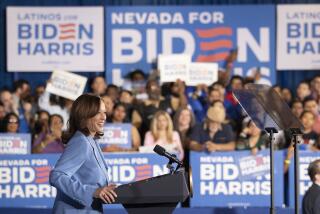Yellen is front-runner for Fed chair, but Obama has other options
WASHINGTON -- With Lawrence H. Summers removing himself from consideration to be the next Federal Reserve chairman, Janet L. Yellen becomes the acknowledged front-runner for the vital economic policy position.
But President Obama still could go another direction, and speculation swirled Monday about other potential candidates, including former Fed Vice Chairman Donald Kohn and former Treasury Secretary Timothy F. Geithner.
Summers, who served Obama’s top economic advisor in 2009-2010, was considered Obama’s first choice for the job. But Summers withdrew Sunday in the face of sharp criticism from many Democrats and strong doubts that he could win confirmation in the Senate.
QUIZ: How well do you understand the Fed stimulus?
Obama was upset about the unprecedented public lobbying by Yellen’s supporters that helped trigger Summers’ decision, according to senior administration officials. That could open the door to another choice to replace Ben S. Bernanke, whose second four-year term as chairman expires in January.
But Obama is not so upset about the lobbying that he would bypass Yellen because of it, said the officials, who requested anonymity because they were not authorized to speak publicly about the nomination process.
Yellen, who has been Fed vice chair since 2010 and a staunch supporter of Bernanke’s policies, appears to be in the driver’s seat for the nomination.
Part of the motivation for the outpouring of Summers criticism was because Yellen’s supporters believed that she was the heir apparent to Bernanke. So Obama would face political heat if he were to nominate someone else now that her chief rival has dropped out.
That Yellen would be the first female Fed chair and was potentially being passed over further angered many liberals, particularly women.
“This makes Yellen the prohibitive front-runner,” Chris Krueger, a senior policy analyst at financial services firm Guggenheim Partners in Washington, said of Summers’ departure. “It’s clearly Yellen’s to lose.”
Krueger had been spot-on this summer in predicting the difficulty Summers would have getting confirmed in the Senate.
Many liberals did not like him because of his support for key deregulatory policies while serving as Treasury secretary in the late 1990s -- policies that they believed opened the door to the financial crisis.
Summers has also made enemies over the years with his domineering personality.
Yellen, who raised early concerns about the potential impact of soaring housing prices before the crisis, was viewed as being less friendly to Wall Street and tougher on financial regulation.
She also was seen as being more concerned about the high unemployment rate, and more likely to address that as Fed chair than Summers. The Fed’s mandate is to maximize employment and keep prices stable, and Summers was viewed by many lawmakers and economists as being more concerned about inflation than unemployment.
“The position of Fed chair is immensely important for our economy and the president has an opportunity to unify the country behind a candidate who understands the impact of the Federal Reserve’s policies on the middle class” said Rep. Maxine Waters (D-Los Angeles), the top Democrat on the House Financial Services Committee.
In July, Waters organized a letter to Obama signed by 37 other female House Democrats, urging him to pick Yellen. Among other things, they argued that Yellen was more concerned about the impact of Fed policies on average Americans.
In a poll last week of 47 Wall Street investment managers and strategists, Yellen was viewed as substantially more concerned about unemployment than Summers.
Although the participants in the CNBC poll said by a 2-to-1 margin that they believed Summers would be Obama’s choice, they also said, by a 5-1 margin, that they preferred Yellen. Reflecting that, financial markets rallied early Monday on the news of Summers’ withdrawal.
The poll’s results were released Monday.
Asked to judge Yellen, Summers and Kohn, along with Bernanke, on 10 qualifications for the Fed job, Yellen came in a close second to Bernanke. Kohn was third and could be a compromise choice for Obama.
Obama has said he was considering Kohn for the nomination, along with Yellen and Summers. Kohn was vice chair from 2006 into 2010, serving alongside Bernanke during the financial crisis. He joined the Fed board in 2002 after years at the central bank as a close advisor to former Fed Chairman Alan Greenspan.
He’s also been a strong supporter of the Fed’s unprecedented actions to boost the economy, though more moderate than Yellen. He was appointed to the Fed by former President George W. Bush and could draw Republican support in the Senate.
Geithner, who is very close to Obama, continues to be mentioned as a possible nominee for Fed chair. He was president of the Federal Reserve Bank of New York from 2003-2009.
But Geithner, who stepped down as Treasury Secretary in January, has remained firm that he’s not interested in the position, said a person familiar with his thinking who was not authorized to speak publicly.
Sheila Bair, the former chairwoman of the Federal Deposit Insurance Corp., said Yellen was the logical choice.
Bair has publicly backed Yellen and criticized Summers and Geithner as being part of “the deregulatory cabal that got us into the 2008 financial crisis.”
After Summers’ withdrawal, Bair tweeted that Yellen was the best choice and would require minimal political capital to confirm because Democratic opposition would be unlikely.
Given the strong liberal support for Yellen and the difficulties Obama had with that wing of the Democratic Party over his push for military action in Syria, her nomination seems like a slam-dunk, Krueger said.
“There are very few options for Obama to regain some stature and popularity with his liberal supporters in the House and Senate,” Krueger said. “The easiest and most obvious would be naming Yellen as the next Fed chair. It is about as close to a political no-brainer as you can get.”
ALSO:
Proposed airline merger could prevent fare increases
Labor and business each a winner in 2013 legislative year
5 years after financial crash, many losers — and some big winners
More to Read
Inside the business of entertainment
The Wide Shot brings you news, analysis and insights on everything from streaming wars to production — and what it all means for the future.
You may occasionally receive promotional content from the Los Angeles Times.












